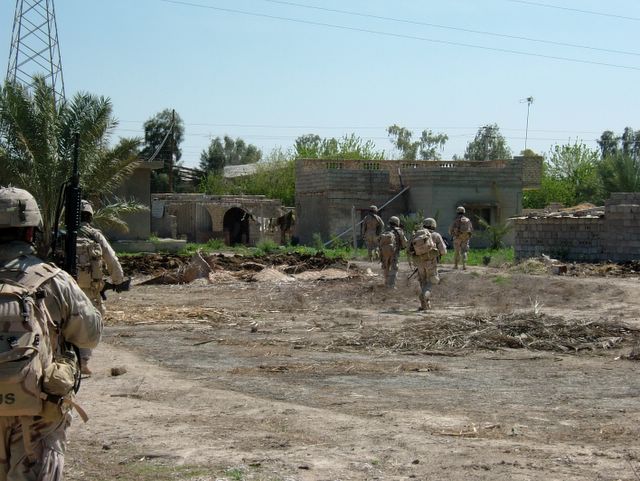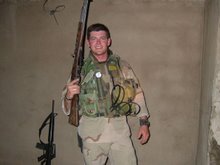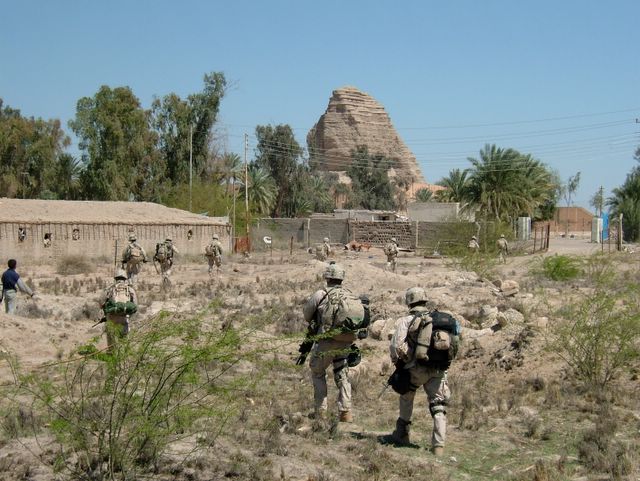From Wikipedia, the free encyclopedia
Dr. Robert Michael Gates (born September 25, 1943) is the president of Texas A&M University, as well as a former Director of Central Intelligence. He is currently the nominee for the office of United States Secretary of Defense. Gates served for 26 years in the Central Intelligence Agency and the National Security Council. Under President George H.W. Bush, he served as Director of Central Intelligence. After leaving the CIA, he wrote his memoirs[1], became president of Texas A&M University, and was a member of several corporate boards. Gates served as a member of the bipartisan commission headed by James A. Baker III, the Iraq Study Group, that has studied the Iraq campaign.
In the wake of the 2006 midterm election result, President George W. Bush announced his nomination of Gates to succeed the resigning Donald Rumsfeld as U.S. Secretary of Defense on November 8, 2006.[2][3] Gates has stated in a letter [4] to students that he will continue as President of Texas A&M until completion of the confirmation process. Gates will now face confirmation first in the Senate Armed Services Committee, and if approved, by a majority vote in the Senate.
Biography
Childhood and education
A native of Wichita, Kansas, Gates attained the rank of Eagle Scout in the Boy Scouts of America and is a recipient of the Distinguished Eagle Scout Award from the Boy Scouts of America. He graduated from Wichita East High School in 1961. Gates received his bachelor's degree from the College of William and Mary in 1965, his master's degree in history from Indiana University in 1966, and his Ph.D. in Russian and Soviet history from Georgetown University in 1974.
Intelligence career
While at Indiana University, Gates was recruited to join the Central Intelligence Agency. However, the CIA offered no exemption from the draft during the Vietnam War. Before joining the CIA full-time as an intelligence analyst, he spent two years in the Air Force. During one posting, at Whiteman Air Force Base in Missouri, he delivered intelligence briefings to ICBM missile crews. [5]
Gates left the CIA in 1974 to serve on the National Security Council staff but returned to the CIA in late 1979. He was named the Director of the DCI/DDCI Executive Staff in 1981, Deputy Director for Intelligence in 1982, and Deputy Director of Central Intelligence from April 18, 1986, to March 20, 1989. He was nominated to become the Director of Central Intelligence in early 1987, but withdrew the nomination after it became clear the Senate would reject it due to controversy[6] about his role in the Iran-Contra affair. Senate members later queried the nomination for the additional reason that Gates allegedly passed intelligence to Iraq during the Iran-Iraq war.[7]
Gates was Deputy Assistant to the President for National Security Affairs from March until August of 1989, and was Assistant to the President and Deputy National Security Adviser from August 1989 until November 1991. He was nominated (for the second time) for the position of Director of Central Intelligence by President Bush on May 14, 1991, confirmed by the Senate on November 5, and sworn in on November 6, becoming the only career officer in the CIA's history (as of 2005) to rise from entry-level employee to Director. Deputy Directors during his tenure were Richard J. Kerr (from November 6, 1991, until March 2, 1992) and Adm. William O. Studeman (from April 9, 1992, through the remainder of Dr. Gates’ tenure).
During his 26-year career as an intelligence professional, he spent almost nine years on the National Security Council, serving four Presidents of both major political parties.
In 1996, his memoirs were published under the title From the Shadows: The Ultimate Insider's Story of Five Presidents and How They Won the Cold War.
Gates has been highly decorated for his service: he was the recipient of the National Security Medal and the Presidential Citizens Medal, was twice awarded the National Intelligence Distinguished Service Medal, and three times received the Distinguished Intelligence Medal.
Involvement in the Iran-Contra Scandal
Owing to his senior status in the CIA, Gates was close to many figures who played significant roles in the Iran-Contra Affair and was in a position to have known of their activities. The evidence developed by Independent Counsel did not warrant indictment of Gates for his Iran-Contra activities or his responses to official inquiries.
Gates was an early subject of Independent Counsel's investigation, but the investigation of Gates intensified in the spring of 1991 as part of a larger inquiry into the Iran/contra activities of CIA officials. This investigation received an additional impetus in May 1991, when President George H.W. Bush nominated Gates to be Director of Central Intelligence (DCI). The chairman and vice chairman of the Senate Select Committee on Intelligence (SSCI) requested in a letter to the Independent Counsel on May 15, 1991, any information that would “significantly bear on the fitness” of Gates for the CIA post.
Gates consistently testified that he first heard on October 1, 1986, from Charles E. Allen, the national intelligence officer who was closest to the Iran initiative, that proceeds from the Iran arms sales may have been diverted to support the Contras. Other evidence proves, however, that Gates received a report on the diversion during the summer of 1986 from DDI Richard Kerr.[8] The issue was whether Independent Counsel could prove beyond a reasonable doubt that Gates was deliberately not telling the truth when he later claimed not to have remembered any reference to the diversion before meeting with Allen in October.
Grand Jury secrecy rules hampered Independent Counsel's response. Nevertheless, in order to answer questions about Gates' prior testimony, Independent Counsel accelerated his investigation of Gates in the summer of 1991. This investigation was substantially completed by September 3, 1991, at which time Independent Counsel determined that Gates' Iran/contra activities and testimony did not warrant prosecution.
Independent Counsel made this decision subject to developments that could have warranted reopening his inquiry, including testimony by Clair E. George, the CIA's former deputy director for operations. At the time Independent Counsel reached this decision, the possibility remained that George could have provided information warranting reconsideration of Gates's status in the investigation. George refused to cooperate with Independent Counsel and was indicted on September 19, 1991. George subpoenaed Gates to testify as a defense witness at George's first trial in the summer of 1992, but Gates was never called.
Career after leaving the CIA
Gates became the 22nd President of Texas A&M University on August 1, 2002 following a tenure as Interim Dean of the George Bush School of Government and Public Service at Texas A&M from 1999 to 2001. He has served as a member of the board of trustees of Fidelity Investments, and on the board of directors of NACCO Industries, Inc., Brinker International, Inc. and Parker Drilling Company, Inc. He also served as President of the National Eagle Scout Association during the mid-2000s.
Director of National Intelligence
In February 2005, Gates wrote in a message posted on his school's website that "There seems to be a growing number of rumors in the media and around campus that I am leaving Texas A&M to become the new director of national intelligence ('Intelligence Czar') in Washington, D.C." The message said that "To put the rumors to rest, I was indeed asked to take the position, wrestled with perhaps the most difficult -- and close -- decision of my life, and last week declined the position."
Gates committed to remain as President of Texas A&M University through the summer of 2007; President George W. Bush offered the position of United States Director of National Intelligence (DNI) to John Negroponte, who accepted.[9]
Gates said in a 2005 discussion with the university's Academy for Future International Leaders that he had tentatively decided to accept the DNI position out of a sense of duty and had written an email that would be sent to students during the press conference to announce his decision, explaining that he was leaving to serve the U.S. once again. Gates, however, took the weekend to consider what his final decision should be, and ultimately decided that he was unwilling to return to Washington, D.C. in any capacity simply because he "had nothing to look forward to in D.C. and plenty to look forward to at A&M."
Secretary of Defense nomination
On November 8, 2006, George W. Bush nominated Gates to serve as Secretary of Defense in the wake of Donald Rumsfeld's resignation. Gates will now face confirmation first in the Senate Armed Services Committee, and if approved, by a general vote in the United States Senate.
Awards and decorations
Gates' awards and decorations include:
Government awards
• National Security Medal
• Presidential Citizens Medal
• National Intelligence Distinguished Service Medal (twice)
• Distinguished Intelligence Medal (thrice)
Other awards
• Eagle Scout
• Distinguished Eagle Scout Award
Quotes
• "Speaking to you all again is a bit like being Larry King's newest wife-- I know what I'm supposed to do here, I'm just not sure how to make it interesting."
• "Were we to become a top ten university and lose that spirit, those traditions, our culture, we would be nothing more than another giant education factory. A big brain with no heart. Hell, we might as well be in Austin."
References
1. ^ Robert Gates, From the Shadows: The Ultimate Insider's Story of Five Presidents and How They Won the Cold War, Simon & Schuster; Reprint edition (May 7, 1997).
2. ^ "Bush replaces Rumsfeld to get 'fresh perspective'", CNN.com, November 8, 2006. Retrieved on 2006-11-08.
3. ^ Sheryl Gay Stolberg and Jim Rutenberg. "Rumsfeld Resigns as Defense Secretary After Big Election Gains for Democrats", New York Times, November 8, 2006. Retrieved on 2006-11-08.
4. ^ To the Aggie Family, Gates' first announcement, and acknowledgement to being nominated for Secretary of Defense
5. ^ "Who Won the Cold War?" Thomas Powers, New York Review of Books, Vol. 43, no. 11 June 20, 1996
6. ^ Although he "was close to many figures who played significant roles in the Iran/contra affair and was in a position to have known of their activities. The evidence developed by Independent Counsel did not warrant indictment...." Final report of the independent counsel for Iran/Contra matters
7. ^ Gates nomination, Senate Proceedings, 1991..
8. ^ GlobalSecurity.org. Iran-Contra Report, Chapter 16.
9. ^ "Bush names Negroponte intelligence chief", CNN.com, February 18, 2005. Retrieved on 2006-11-08.
Sources
• Robert M. Gates: From the Shadows: The Ultimate Insider's Story of Five Presidents and How They Won the Cold War. Simon & Schuster 1997, ISBN 0684834979
• Author Unknown. "Biography, Dr. Robert M. Gates, President, Texas A&M University," Texas A&M University. (2003)
• Center for the Study of Intelligence. "Robert Michael Gates," Directors & Deputy Directors of Central Intelligence. (2004)
• Material on Gates, from The Literature of Intelligence: A Bibliography of Materials, with Essays, Reviews, and Comments, by J. Ransom Clark
• Brett Nauman. "Gates passes on intelligence czar post," The Bryan-College Station Eagle. (February 1, 2005)
Further reading
Wikimedia Commons has media related to:
• Robert Gates, From the Shadows: The Ultimate Insider's Story of Five Presidents and How They Won the Cold War, Simon & Schuster; Reprint edition (May 7, 1997).
• Robert Gates, US Intelligence and the End of the Cold War, 1999, CIA
• Robert Gates, Frontline The Gulf War: An Oral History: Interview with Robert Gates, Deputy National Security Advisor, 2001, PBS.org
• Writings and Speeches












